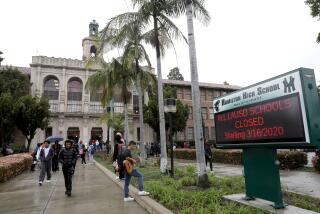Santa Clarita / Antelope Valley : Bonds to Be Used to Save Auto Mall : Government: The $24-million issue approved by Palmdale leaders is calculated to stave off potential defaults on two city assessment districts.
PALMDALE — In a move aimed at saving the city’s financial reputation and its troubled auto mall, the City Council has approved a plan to pay off the auto mall’s nearly $13 million in assessment debts as part of a new $24-million bond issue.
The payments, finalized in a 5-0 council vote Wednesday night, will stave off potential defaults on two city assessment districts formed several years ago to fund improvements in a nearly 600-acre area. The area remains largely vacant except for the auto mall and a regional shopping center.
Had either of the assessment districts defaulted on their debts, the city’s financial reputation would have been tarnished. And potential property foreclosures in the districts to pay off the debts could have ruined the city’s plans to complete the auto mall and other area projects.
The assessments are like a mortgage on the property that developers own within the districts. Typically, bonds are issued to finance public improvements, and then property owners pay off the debt over several decades.
City officials figured area property owners would be able to pay their assessment obligations by quickly developing major projects in the late 1980s along the Antelope Valley Freeway. But the recession stalled those plans and caused owners to fall several million dollars delinquent in payments.
“This doesn’t save us forever, but it does buy us some time. It clears up problems at least for the next several years,” said Palmdale Finance Director Bill Ramsey. The planned infusion of bond money should support the districts until the economy improves and development can occur, Ramsey said.
The city already was responsible for paying assessment district obligations for the 65-acre auto mall. But instead of paying off that debt over the next 20-plus years as originally planned, the city will help rescue the districts by paying off the auto mall’s entire assessment debt now.
The city, hoping to spur the auto mall’s completion, acquired the project’s remaining 37 undeveloped acres in May through an estimated $6-million buyout of the private developer of the struggling two-year-old complex. The five operating auto dealers own the remainder of the project.
The city had already budgeted most of the money to pay the annual debt on the auto mall portion of the new $24-million bond issue. The city had figured to pay annual assessment payments of about $630,000 for its land and another $650,000 for the dealers under their contracts with the city.
Apart from saving the assessment districts, the $24-million issue will have two other impacts, city officials said. The drain on city redevelopment funds used to pay the new debt will last seven to nine years longer until 2023. But the move also will free about $650,000 a year in city general funds.
The problems of the two assessment districts had been attracting statewide attention. The districts’ original two bond issues were listed in June among 41 in the state placed on a “watch list” by the California Municipal Bond Advisor, a private, Palm Springs-based financial newsletter.
Zane Mann, the newsletter’s publisher, said the financial community had been closely watching Palmdale’s problems because the two bond issues, which totaled nearly $64 million, were among the largest of their kind in the state. Mann applauded the city’s move to stabilize them.
Before the city’s buyout of the auto mall, city officials said one of the districts would have been unable to meet its bond payments due this September. Its reserve fund had dwindled to $167,000 and the bonds’ value fell to 50 cents on the dollar before recovering recently to the 70-cent range.
Both original bond issues paid for streets, sewers and other improvements within the two districts. The remaining proceeds from the city’s new $24-million issue will pay financing expenses and restructure debt on two other city bond issues to gain lower interest rates.
More to Read
Sign up for Essential California
The most important California stories and recommendations in your inbox every morning.
You may occasionally receive promotional content from the Los Angeles Times.










